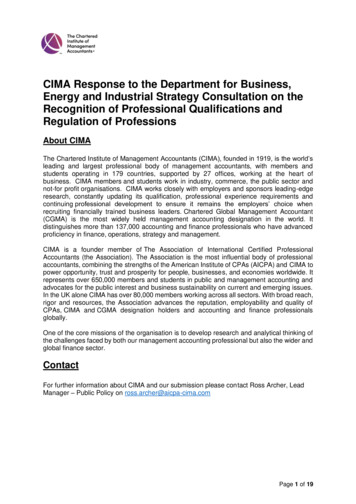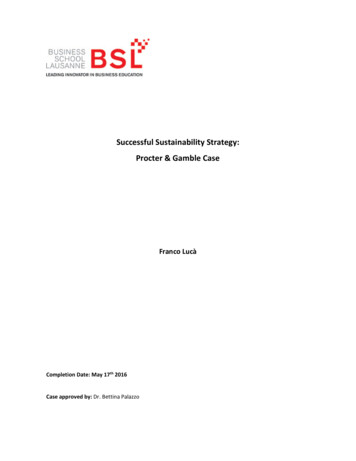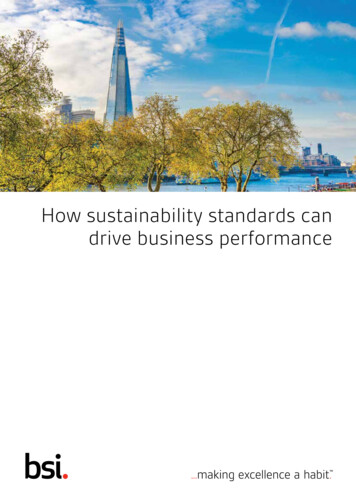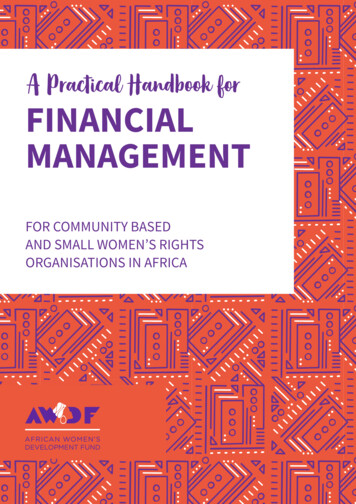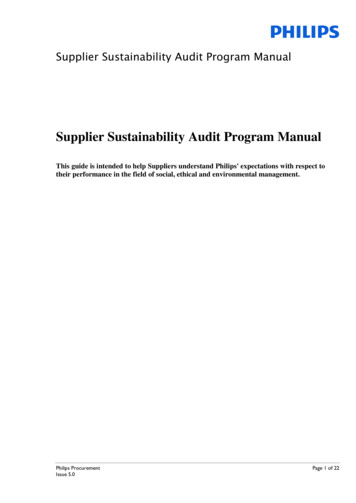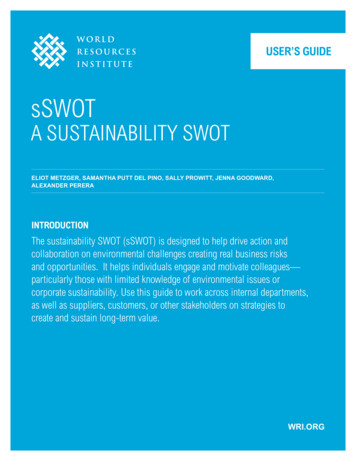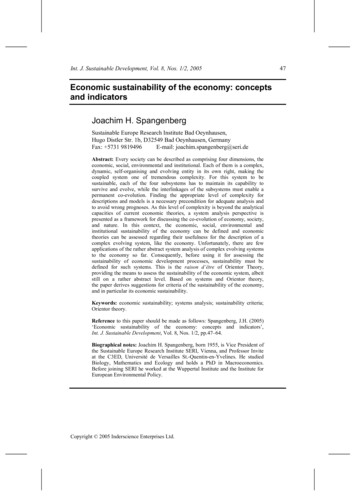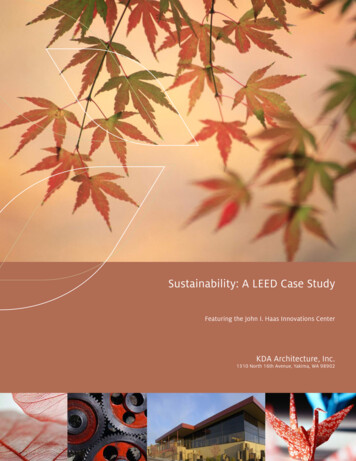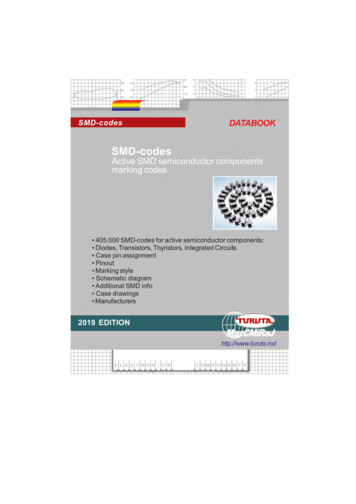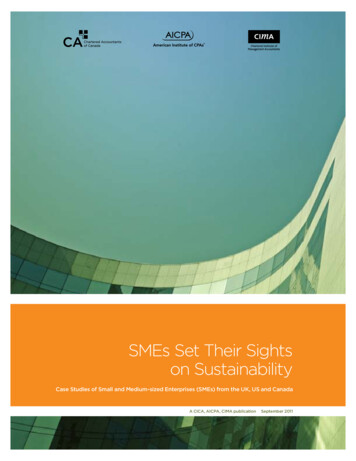
Transcription
SMEs Set Their Sightson SustainabilityCase Studies of Small and Medium-sized Enterprises (SMEs) from the UK, US and CanadaA CICA, AICPA, CIMA publicationSeptember 2011
About CIMAwww.cimaglobal.com/sustainabilityThe Chartered Institute of Management Accountants, founded in 1919, is the world’sleading and largest professional body of management accountants, with 183,000 members and students operating in 168 countries, working at the heart of business. CIMAmembers and students work in industry, commerce, the public sector and not-for-profitorganisations. CIMA works closely with employers and sponsors leading edge research,constantly updating its qualification, professional experience requirements and continuing professional development to ensure it remains the employers’ choice when recruitingfinancially-trained business leaders.About the AICPAwww.aicpa.orgThe American Institute of Certified Public Accountants (AICPA) is the world’s largestassociation representing the accounting profession, with nearly 370,000 members in128 countries. AICPA members represent many areas of practice, including businessand industry, public practice, government, education and consulting; membershipis also available to accounting students and CPA candidates. The AICPA sets ethicalstandards for the profession and U.S. auditing standards for audits of private companies, non-profit organizations, federal, state and local governments. It develops andgrades the Uniform CPA Examination.About the CICAwww.cica.ca/sustainabilityThe Canadian Institute of Chartered Accountants represents Canada’s CA professionboth nationally and internationally.Chartered Accountants (CAs) are Canada’s most valued, internationally recognizedprofession of leaders in senior management, advisory, financial, tax and assuranceroles. Through their integrity, expertise, and internationally recognized qualificationstandards, Canada’s 78,000 CAs sustain their influence and leadership position both inCanada and globally. As trusted business advisors to Canadian organizations of all sizes,Canada’s CAs foster confidence in Canadian business and contribute to the health andsustainability of Canada’s capital markets and economy. The CICA is a founding member of the International Federation of Accountants (IFAC) and the Global AccountingAlliance (GAA).Library and Archives Canada Cataloguing in PublicationSustainability and SMEs / AICPA, CICA, CIMA.Issued in electronic format.ISBN 978-1-55385-616-01. Small business--Environmental aspects--Case studies. 2. Social responsibility of business--Case studies. 3. Environmentalresponsibility--Case studies. 4. Sustainable development--Case studies. I. American Institute of Certified Public Accountants II. Canadian Institute of Chartered Accountants III. Chartered Institute of Management AccountantsHD60S87 2011658.4’083C2011-905902-9Copyright 2011 The Canadian Institute of Chartered Accountants, the American Institute of CPAs and Chartered Institute of Management Accountants. All rights reserved. This publication is protected by copyright and written permission is required to reproduce, storein a retrieval system or transmit in any form or by any means (electronic, mechanical, photocopying, recording, or otherwise).For information regarding permission, please contact permissions@cica.ca, copyright@aicpa.org or research@cimaglobal.com.
INTRODUCTIONEvolution or revolution? Many paths to sustainabilityThere are many ways to interpret the term sustainability, but whetherit means environmental performance, corporate citizenship, longterm business perspectives or all three, it is a growing priority forbusinesses of all sizes. We spoke to many small and medium-sizedenterprises (SMEs) to find out how smaller companies can implementsustainable business practices for the benefit of the environment, theircommunities, their customers and their bottom line.There can be no doubt that sustainability has become an important priority for manybusinesses across Europe and North America over the last decade as leading companies have recognized that successful sustainability performance translates to successfulbusiness performance. But sustainability means so much more than reducing greenhouse gas emissions or improving energy efficiency. It also means businesses becomingmore involved in their local communities and setting long-term goals that go beyondthe next quarter’s financial results.In 2010 the AICPA, CIMA and CICA, all of which are members of the Prince’s Accountingfor Sustainability Project (A4S), surveyed over 2,000 organizational leaders and interviewed sustainability executives to determine the state of corporate sustainability practices and the level of finance function involvement in corporate sustainability initiatives.Over 1,300 of the responses were from SME companies (less than 1,000 employees).The importance of this wider, long-term perspective on sustainability is borne out bythe case studies in the following pages compiled by CICA, CIMA and AICPA. They showSMEs taking very different approaches to the same core issues and highlight the findings of the 2010 survey, which charted the growing emphasis SMEs are placing on everyaspect of sustainability.The survey showed that one-third of smaller companies have a defined sustainabilitystrategy, and a further 23% intend to develop one in the next two years. Their reasonsfor doing so may vary, but the core message is that sustainability is good for business. Insome industries it appeals to customers’ changing values, it may strengthen relationshipswith suppliers, it can have a huge impact on the positioning of a brand as a good corporate citizen that operates in harmony with local communities and the environment, and itcan reduce the variable costs of running a business and, therefore, drive profitability.Discussions of these kinds of business benefit have often been framed in the contextof large, multinational companies, but smaller businesses are also making great effortsSMEs Set Their Sights on Sustainability Case Studies from the UK, US and Canada iii
to become more sustainable. In many cases they can also lead the market and becomechampions of sustainable business practices.If there were any doubt about how important sustainability is to the SMEs, one needonly look at how their customers are changing their attitudes. Increasingly, they arelooking at the environmental performance of companies from which they buy, and areoften drawn to firms that emphasize sustainable business practices.The case studies that follow show that across different business models there aresome universal truths on which companies converge. Some began with sustainabilityas the fundamental principle driving the company, while others have steadily shiftedwell-established businesses towards a more sustainable model, but all have found thatemphasizing sustainability improves their profitability, generates greater loyalty andcommitment from employees, and cements relationships with customers and suppliers. Their experience shows that any SME, in any industry, can take meaningful stepstowards sustainable business practices and quickly see benefits accrue.From its work with larger organizations the A4S has identified 10 elements that areintegral to embedding sustainability within organizations. These case studies illuminatea similar set of elements that are crucial for SME companies to implement sustainablepractices in smaller organizations.Key Elements to Implementing Sustainable Business Practices in SMEsStrategy and planning1.Take a broad view of sustainability. Understand the key sustainability drivers andopportunities for your organization. As important as they are, remember to lookbeyond environmental issues. Finding innovative ways in which your company canbe a good corporate citizen to the benefit of employees, customers and supplierswill yield benefits to your business.2.Define in detail what sustainability means to your company. With a clear definition towhich everyone in the company can refer and clear success measures, any effortsto invest in sustainability or change business practices will focus on the right goals.3.Engage all stakeholders. Talk to customers, suppliers, investors and employeesabout sustainability, so that their voices can be heard in the debate, and the strategy you develop will be able to address all of their needs. Include them and get asmuch of their weight behind the strategy as possible.Execution and alignment4. Remember that you are not alone. National, international and industry-wide initiatives exist that help businesses become more sustainable. Engage with theseorganisations, tap into their knowledge and experience. This way, implementing asustainability strategy will be quicker and easier.5.Establish responsibility and communicate widely. The delivery of any strategy ismore successful if an organisation knows who is in charge of it. Have senior man-iv SMEs Set Their Sights on Sustainability Case Studies from the UK, US and Canada
agement drive the policy, appoint sustainability champions and communicate theimportance of sustainability to every level of the company.6.Take it step by step. Becoming more sustainable is usually a process of evolution,not revolution. By making small changes now a company can affect significantchange in the future.7.Walk the talk. Any company can talk about being more sustainable, but if it doesnot back up its words with meaningful actions its claims will quickly be seenthrough. Customers and investors are wise to greenwashing, so never make themistake of seeing sustainability as a marketing exercise.Performance and reporting8.Tie sustainability to profit. Becoming more sustainable often means being moreefficient. Resource efficiency, for instance, benefits the environment and reducesthe cost of running a business. Make the link between consuming less water andelectricity, or producing less waste, and improving profits clear within your business.9.Measure, monitor and review. Tracking progress towards the goals of a sustainabilitystrategy is vital in justifying it to management, and in fully understanding the commercial benefit it brings. Develop clear metrics, review them regularly and whetherprogress is fast or slow, keep setting realistic, attainable targets.10. Invest in the future. Investing in sustainability does not always require huge capitalexpenditure. Many SMEs say the biggest investment is management time.Critical Role of the Finance FunctionIn many SMEs, including those in the case studies that follow, the finance functionplays a critical role in formulating and implementing a sustainability strategy. It oftendefines the metrics that determine the strategy’s goals and monitors progress. Italways creates the vital link between investment in the strategy and the commercialbenefit that accrues.Finance professionals are at the heart of the data gathering processes that enable anorganisation to show how well it is improving its performance around specific goals.Furthermore, the finance function often has strong ties with all departments within abusiness, so it can effectively co-ordinate the efforts of the company as a whole. As suchit is often the guardian of the sustainability strategy, but it can also be the originator of it.The most compelling message from our discussions with SMEs is that sustainability notonly serves altruistic motives, but is also good business because it can deliver higherprofit — both in the short and the long term. A sustainable business is more efficient, morerobust and has closer ties with customers and suppliers — all of which is music to the earsof the CFO, the CEO, shareholders and, in fact, all of the stakeholders in a company.SMEs Set Their Sights on Sustainability Case Studies from the UK, US and Canada v
AcknowledgementsThis report was prepared with the advice and counsel of:Nicholas F. Cheung, CA,National Practice Area Leader – Sustainability, CICASandra Rapacioli,R&D Manager, Thought Leadership and Partnership Research, CIMAKenneth Witt, CPA,Technical Manager, Business, Industry & Government, AICPAvi SMEs Set Their Sights on Sustainability Case Studies from the UK, US and Canada
Index of case studiesFrom sceptic to true believer. 1UKOSInitially skeptical, stationery and business supplies provider UKOS plc has not onlyreduced its energy costs by an average of 5% year-on-year for the last four years, it has alsorealized increased sales and profits by differentiating itself as a sustainable supplier.Small companies can initiate big change . 5Rocky Mountain FlatbreadBuilt firmly on a platform of sustainability, restaurant chainand catering company Rocky Mountain Flatbread is committed to reducing waste, minimisingemissions and embedding itself in the community. Its business model proves that environmentalissues are just one aspect of sustainability, which also encompasses relationships with suppliers,customers and employees, an active role in the local community, and the importance ofprofitability.Built on the bedrock of sustainability .9Ecological Fibers, Inc.From its inception in the 1970s, paper coatings provider EcologicalFibers, Inc. has been committed to environmentally friendly manufacturing processes. Bydefining its entire business on sustainable principles over the decades it has proven thecommercial benefit of sustainability.Heeding the call of customers .13ArtopexIn response to changing demands in customer purchasing decisions, office furnituremanufacturer Artopex has taken a comprehensive approach to sustainability. The resulting costsavings and efficiencies have helped it maintain its commercial advantage against competitiveimports from Asia.The foundations of good business .17BillingtonIntent on pursuing internationally recognized standards of environmentalaccreditation, structural steel manufacturer Billington Structures soon found that sustainablepractices held great appeal for its customers and drove new client wins.Doing the right thing.21CirtronicsThough it cannot precisely measure the benefits of its extensive corporate givingschemes and employee volunteering programmes, Cirtronics engages in these activities to be agood corporate citizen because it believes that doing so is one of the keys to its success and itsfuture.Efficiency first .25Rainbow NightfreightIn an industry under scrutiny for its level of carbon emissions, haulierRainbow Nightfreight targeted fuel efficiency for the commercial reason of cutting operatingcosts, but has found as a consequence that its sustainable performance has improved, bringingunanticipated advantages in terms of the appeal of its business model to customers.Talking the talk and walking the walk . 29Zions Energy LinkBy “walking the talk”, Zions Energy Link, a bank, has reduced its ownpower consumption by 40% with a solar installation, while maintaining a profitable businessmodel making commercially viable loans to customers financing renewable and energy efficiencyprojects.A flying start for sustainability . 33Aéroports de MontréalBy embracing industry initiatives, Aéroports de Montréal exemplifiesthe aviation industry’s willingness to commit to the reduction of carbon emissions. By committingto energy efficiency, waste reduction, skills development and community projects it has cut costsand greatly improved relations with the local community.SMEs Set Their Sights on Sustainability Case Studies from the UK, US and Canada vii
From sceptic to true believerThe finance director of office equipment supplier UKOS plc wasunsure about the benefit of embracing sustainability as a platform forthe company’s wider business strategy, but lower costs and highersales have made him a convert to the green agenda.For many SME’s the idea of implementing a sustainability strategy may seem like asource of additional cost at a time when maximising efficiency is high on the agenda.For those that try it, however, the results are often surprising. Sustainability can, in fact,be the key to efficiency and help an organisation to keep its costs down.“We started our sustainability strategy because a few years ago I joined the Hertfordshire Resource Efficiency Club to see if there were ways we could save on resourceslike gas and electricity. From that came ideas about corporate social responsibility andwe realised that we could differentiate ourselves from our competitors by being moreenvironmentally friendly,” says Jerry Young, ACMA, Finance Director of stationery andoffice equipment supplier UKOS plc and member of CIMA.“We produced a business systems manual that details how each person and eachdepartment should do their job. This helps us to manage employees and measure theirperformance. It also meant we could apply for ISO 9001 and other accreditations. Werealised that a sustainability strategy could make us very different to our competitors,save us money and give our customers good reasons to buy from us.”The initiative has resulted in practical steps, such as the Box4Life project, in whichreusable, corrugated propylene boxes replace disposable cardboard boxes. UKOSpreviously delivered around 70,000 cardboard boxes every year, but has made majorsavings on packaging materials.“We set this up with customers that want it, collecting the empties when we delivereach day. Customers like it because it credits their own environmental strategies. Wealso looked at our delivery routes. The industry norm is next-day delivery, but for somecustomers we can change this to regular deliveries three times a week. Some customershave changed their buying patterns to fit our delivery schedule,” says Young.SMEs Set Their Sights on Sustainability Case Studies from the UK, US and Canada 1
“We realised that a sustainability strategy could make us very differentto our competitors, save us money and give our customers goodreasons to buy from us”.“We also looked at our products. In our business there is a lot of paper, so we lookedclosely at what makes environmentally friendly paper. We found a great sustainable paper, but found out that it was shipped from Australia, which meant we didn’tchoose it. We now have a ‘green’ catalogue of products.”UKOS plc also collects recyclable waste — including cardboard, printer toners andplastics — from some customers, rather than returning lorries empty to the depot after adelivery. This costs the company very little, generates a small amount of revenue fromselling the material and ties customers into the services provided by UKOS.Simple, clever ideas like this are having a big impact on the company. Among the tangible results of its sustainable strategy are savings on energy. UKOS has cut its energycosts by an average of 5% year-on-year for the last four years, and has reduced its useof cardboard boxes — which account for around 0.5% of sales — by 65%.“Simple, clever ideas like this are having a big impact on the company.Among the tangible results of its sustainability strategyare savings on energy spend.”The role of financeMeasuring these efficiency gains is vital to proving the value of any sustainabilitystrategy and finance plays a key role in gathering the relevant data and communicatingthe results to the rest of the organisation. Young produces energy usage graphs eachmonth to show the impact of the sustainability strategy, and there is a monthly reviewof the amount of packaging materials used.Alongside the review process, finance also has a central role in setting key objectives inareas such as fuel efficiency. With the right metrics in place the benefits of the strategy become visible, which goes a long way to justifying the initial investment that isrequired.“There is some investment to be made, of course, but it is mostly an investment of timerather than money. The project is led by me in terms of administration, while the marketing manager handles the promotion of the sustainability agenda to customers andstaff. The finance department is very important. It produces the measurements andresults, and we have the discipline to do it regularly,” stresses Young.“You have to make it real, set targets and let people see the results. We have a greenchampion — usually someone fairly junior — who is responsible for simple things likemaking sure the lights are turned off. And we allow our employees to come up withgood ideas.”2 SMEs Set Their Sights on Sustainability Case Studies from the UK, US and Canada
An example of employee input into sustainability is the habit the company’s drivershave developed of measuring the miles per litre they achieve on each delivery run. Theycompete to be the most efficient.Getting to the stage where sustainability is part of the daily routine of every employeerequires consistency and commitment at every level, but especially among seniormanagers.“You have to make it real,set targets and let people see the results.”“The idea is easy to sell to staff if you maintain it. You must do this for life. The biggestchallenge was to start it off and get all of the department heads to write the businesssystems manual. I needed to convince them of the positives that would come at the endof the process,” says Young.“The business systems manual forced us to look at all the parts of our business. I wentinto the resource efficiency club as a sceptic but now I am a convert. Our sustainabilitystrategy is saving us money, increasing sales and improving profits, which we would nothave foreseen.”Key lessons Get involved in community or industry initiatives to kickstart a sustainability drive Codify practical measures for sustainability in a document that everyone in theorganisation can access and understand, like UKOS plc’s business systems manual Put in place metrics to measure the performance of employees and the organisation as a whole on sustainability Look for ways in which sustainability can reduce costs, rather than increasing costs Work with your customers to finds ways in which buying patterns and supply practices can become more resource-efficient Invest time at management level and get the finance function to lead on sustainability Build a sustainable strategy that has a long-term perspective Set clear, realistic targets and share information about progress throughout theorganisation Appoint ‘green champions’ to embed sustainability in the organisationSMEs Set Their Sights on Sustainability Case Studies from the UK, US and Canada 3
About UKOSFrom its formation in 2000 UKOS has established itself as a company that stands apartfrom its competitors when it comes to customer service, value and reliability. Offeringoffice stationery and business supplies from the United Kingdom UKOS was awarded1st place by The Sunday Times Best Green Companies last year, and featured in a dedicated supplement, published in May 2010.About Jerry Young, ACMA, Finance Director, UKOSJerry was a founding member of UKOS in 2000 and is responsible for all finance, legal,company secretarial matters and also HR responsibilities. Prior to UKOS, Jerry held anumber of senior financial positions within the office products industry, finishing withbeing the Finance Director of Guilbert UK. Jerry is a qualified Chartered ManagementAccountant and a member of CIMA.4 SMEs Set Their Sights on Sustainability Case Studies from the UK, US and Canada
Small companies can initiate big changePMS 497PMS 729PMS 5777Edward Wong Vertex Design Inc.1677 West 2nd Ave. Vancouver BC V6J 1H3604.683.6190T vertexdesign@shaw.caCelebrating 25 Years of Creative ExperienceNew companies that are founded on sustainability as the fundamentalguiding principle that drives every aspect of their business have thepower to start a process that can transform entire industries.Small businesses have great power. Some have the chance to build a business fromscratch on the platform of sustainability. Others have more agility than large multinationals to make meaningful change and show the benefits that can accrue from sustainable business practices.“Small businesses are leading the way in terms of shaping how business will be in thefuture,” says Suzanne Fielden, co-founder of Rocky Mountain Flatbread.Founded seven years ago in Vancouver, Canada, Rocky Mountain Flatbread is a brandthat comprises a pizza restaurant, a wholesale business, a mobile caterer and an educational society. Founded by Fielden and her husband, who had both been successful asleadership and management consultants in the UK dealing with change and leadershipmanagement, the company embodies their knowledge about integrating social andenvironmental agendas into corporate strategy.The company exists not only to generate profit, but also to create a positive changein the world by acting locally to address the global issue of sustainability.“In the UK, we introduced sustainability to a lot of companies and identified the business opportunities that it presented. We worked in schools, too, on projects like transforming business waste into usable, value-added products. One chemical by-product isstill used to de-ice planes at Bristol Airport,” says Fielden.“When it came to creating a brand of our own we wanted it to be based on our sustainable principles. We chose the pizza business because it is often done badly. We did alot of research and looked at a lot of different business models and we integrated ourbackgrounds, which is why we have an educational society working with local schoolsas well as a restaurant.”SMEs Set Their Sights on Sustainability Case Studies from the UK, US and Canada 5
“Small businesses are leading the wayin terms of shaping how business will be in the future”.To survive, any restaurant needs good food and great service, so the companybrought in a Red Seal chef, Oliver Zulauf, as a partner to create & standardize the menuand set high service standards to ensure that the business had a commercially viableplatform. From there, the goal was to integrate sustainable practices into every part ofthe business model. It created a zero waste menu, for example, and every meal servedis carbon neutral as the company limits its emissions and buys carbon credits to offsetwhat remains.It aims for constant improvement to its products, but has a simple approach to metrics.Co-founder Dominic Fielden looks after the finance function, and his father David, aChartered Accountant who has worked for the likes of American Express, 3i and SGWarbug, sits on the board to provide advice on finance and strategy.The company tracks its carbon footprint and makes a conscious effort to reduce itevery year, and it keeps a close watch on the number of community projects with whichit engages, aiming to increase this number every year.Sustainability as a point of difference“People are looking for meaning, for companies that are doing something positive.Sustainability differentiates us. We use up to 90% local produce, including vegetablesfrom the schools where we teach kids how to grow food. This year we became the firstcompany to switch to biogas, which is captured by the local sewage plant and put intothe gas grid. We use it to fire all of our ovens. We have also reached 100% compostingof all our food,” says Fielden.“Our approach also creates a positive work environment. We keep people for years inan industry that is notorious for high staff turnover. The principles of the company makepeople proud to work here.”“People are looking for meaning, for companies that are doingsomething positive. Sustainability differentiates us”.One of the key tools the company has used to integrate sustainable practices is thesystems thinking approach developed by Gunter Pauli, founder and director of ZeroEmissions Research and Initiatives. Among the many implications of this approach tobusiness is the idea of clusters of businesses or industries working together, which ispartly why Rocky Mountain Flatbread emphasises networking and engagement withlocal organisations such as Vancouver Aquarium’s Ocean Wise programme on sustainable seafood, the Green Table Network, and educational organisation Natural Step.“We are very well networked. Find out who can help you in your community. If youwant to transform an industry and make positive change then you need the ethos thatallows you to make small changes. Community is very important to us, which is whywe go into schools and teach kids about growing food and making healthy snacks. We6 SMEs Set Their Sights on Sustainability Case Studies from the UK, US and Canada
consult with urban gardeners and we fund community projects. We connect to anything that promotes food security and sustainability,” explains Fielden.The motivation is partly the altruistic desire to be a good corporate citizen andmake a difference to the world, but this is not at the expense of long-term commercial success. The company has succeeded in making a profit, some of which isput towards community projects. Customers’ attitudes are changing, and they areincreasingly looking for companies that are environmentally and socially aware.“If you want to transform an industry and make positive changethen you need the ethos that allows you to make small changes.”“Sustainability and profitability are parts of the same approach. People are less tolerant of
towards sustainable business practices and quickly see benefits accrue. From its work with larger organizations the A4S has identified 10 elements that are integral to embedding sustainability within organizations. These case studies illuminate a similar set of elements th

